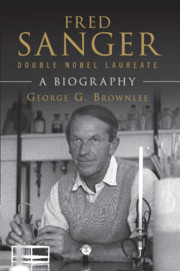Book contents
- Frontmatter
- Dedication
- Contents
- List of figures
- Foreword
- Acknowledgements and original sources
- Brief chronology
- Honours
- Introduction
- 1 A Quaker upbringing
- 2 How about studying insulin?
- 3 Radioactive sequencing of proteins and nucleic acids
- 4 Interview of Fred by the author in 1992: Early life
- 5 Interview of Fred by the author in 1992: Insulin and the Biochemistry Department, University of Cambridge
- 6 Interview of Fred by the author in 1992: Nucleic acids at the MRC Laboratory of Molecular Biology, Cambridge
- 7 Post-Sanger sequencing: high-throughput automated sequencing
- 8 Cancer: the impact of new-generation sequencing
- 9 Commentaries on Fred Sanger’s scientific legacy
- Epilogue
- Appendix: Complete bibliography of Fred Sanger
- Notes
- Index
- Plates
8 - Cancer: the impact of new-generation sequencing
Published online by Cambridge University Press: 05 November 2014
- Frontmatter
- Dedication
- Contents
- List of figures
- Foreword
- Acknowledgements and original sources
- Brief chronology
- Honours
- Introduction
- 1 A Quaker upbringing
- 2 How about studying insulin?
- 3 Radioactive sequencing of proteins and nucleic acids
- 4 Interview of Fred by the author in 1992: Early life
- 5 Interview of Fred by the author in 1992: Insulin and the Biochemistry Department, University of Cambridge
- 6 Interview of Fred by the author in 1992: Nucleic acids at the MRC Laboratory of Molecular Biology, Cambridge
- 7 Post-Sanger sequencing: high-throughput automated sequencing
- 8 Cancer: the impact of new-generation sequencing
- 9 Commentaries on Fred Sanger’s scientific legacy
- Epilogue
- Appendix: Complete bibliography of Fred Sanger
- Notes
- Index
- Plates
Summary
If we know the complete sequence of the human genome and understand how it works, and how tumours are formed, then we can begin to understand how to deal with tumours better.
Both of Fred Sanger’s parents died of cancer at relatively young ages, his father, Frederick, aged 60 in 1937 from an operation to remove a stomach cancer. His mother, Cicely, aged 58, died a year later from cancer of the colon. Fred Sanger was a young man of 20 then – still studying at Cambridge for his first degree. At that young age, he could not have imagined that later in his life it would be his research that would make the dream of sequencing the human genome a reality. In 1938 it would have been a leap of faith to predict that by the beginning of the twenty-first century, the entire human genome would have been sequenced.
Fred rarely allowed himself the luxury of predicting future results of research. ‘I don’t want to look into the future very much. I’m a scientist not an astrologer! I don’t like to predict things you can’t be too sure about.’ He believed in evidence, not in theories of what might be possible and how long it might take to solve a problem. But we know that Fred hoped that his research might lead to medical advances even though he rarely spoke about this in public. In 1992, in an interview with a journalist, he said: ‘If we know the complete sequence of the human genome and understand how it works, and how tumours are formed, then we can begin to understand how to deal with tumours better.’ The knowledge that cancer had caused the early death of both his parents may have been in the back of Fred’s mind when he made this remark.
- Type
- Chapter
- Information
- Fred Sanger - Double Nobel LaureateA Biography, pp. 146 - 152Publisher: Cambridge University PressPrint publication year: 2014



